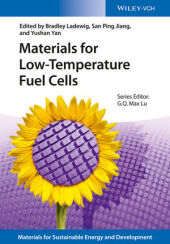 Neuerscheinungen 2015Stand: 2020-02-01 |
Schnellsuche
ISBN/Stichwort/Autor
|
Herderstraße 10
10625 Berlin
Tel.: 030 315 714 16
Fax 030 315 714 14
info@buchspektrum.de |

San Ping Jiang, Bradley Ladewig, Yushan Yan
(Beteiligte)
Materials for Low-Temperature Fuel Cells
Herausgegeben von Ladewig, Bradley; Jiang, San Ping; Yan, Yushan
1. Auflage. 2015. 272 S. 60 SW-Abb., 25 Farbabb., 15 Tabellen. 244 mm
Verlag/Jahr: WILEY-VCH 2015
ISBN: 3-527-33042-9 (3527330429)
Neue ISBN: 978-3-527-33042-3 (9783527330423)
Preis und Lieferzeit: Bitte klicken
There are a large number of books available on fuel cells; however, the majority are on specific types of fuel cells such as solid oxide fuel cells, proton exchange membrane fuel cells, or on specific technical aspects of fuel cells, e.g., the system or stack engineering. Thus, there is a need for a book focused on materials requirements in fuel cells. Key Materials in Low-Temperature Fuel Cells is a concise source of the most important and key materials and catalysts in low-temperature fuel cells. A related book will cover key materials in high-temperature fuel cells. The two books form part of the "Materials for Sustainable Energy & Development" series.
Key Materials in Low-Temperature Fuel Cells brings together world leaders and experts in this field and provides a lucid description of the materials assessment of fuel cell technologies. With an emphasis on the technical development and applications of key materials in low-temperature fuel cells, this text covers fundamental principles, advancement, challenges, and important current research themes. Topics covered include: proton exchange membrane fuel cells, direct methanol and ethanol fuel cells, microfluidic fuel cells, biofuel cells, alkaline membrane fuel cells, functionalized carbon nanotubes as catalyst supports, nanostructured Pt catalysts, non-PGM catalysts, membranes, and materials modeling.
This book is an essential reference source for researchers, engineers and technicians in academia, research institutes and industry working in the fields of fuel cells, energy materials, electrochemistry and materials science and engineering.
KEY MATERIALS FOR LOW-TEMPERATURE FUEL CELLS: AN INTRODUCTION
ALKALINE ANION EXCHANGE MEMBRANE FUEL CELLS
Fuel Cells
PEM Fuel Cell Principles
Alkaline Fuel Cells
Summary
CATALYST SUPPORT MATERIALS FOR PROTON EXCHANGE MEMBRANE FUEL CELLS
Introduction
Current Status of Support Materials and Role of Carbon as Support in Fuel Cells
Novel Carbon Materials as Electrocatalyst Support for Fuel Cells
Conductive Metal Oxide as Support Materials
Metal Carbides and Metal Nitrides as Catalyst Supports
Conducting Polymer as Support Materials for Fuel Cells
Conducting Polymer-Grafted Carbon Materials
3M Nanostructured Thin Film as Support Materials for Fuel Cells
Summary and Outlook
ANODE CATALYSTS FOR LOW-TEMPERATURE DIRECT ALCOHOL FUEL CELLS
Introduction
Anode Catalysts for Direct Methanol Fuel Cells: Improved Performance of Binary and Ternary Catalysts
Anode Catalysts for Direct Ethanol Fuel Cells: Break C-C Bond to Achieve Complete 12-Electron-Transfer Oxidation
Anode Catalysts for Direct Polyol Fuel Cells (Ethylene Glycol, Glycerol): Cogenerate Electricity and Valuable Chemicals Based on Anion Exchange Membrane Platform
Synthetic Methods of Metal Electrocatalysts
Carbon Nanomaterials as Anode Catalyst Support
Future Challenges and Opportunities
MEMBRANES FOR DIRECT METHANOL FUEL CELLS
Introduction
Basic Principles of Direct Methanol Fuel Cell Operation
Membranes for Direct Methanol Fuel Cells
Membrane Properties Summary
Conclusions
HYDROXIDE EXCHANGE MEMBRANES AND IONOMERS
Introduction
Requirements
Fabrications and Categories
Structure and Properties of Cationic Functional Group
Structure and Properties of Polymer Main Chain
Structure and Properties of Chemical Cross-Linking
Prospective
MATERIALS FOR MICROBIAL FUEL CELLS
Introduction
MFC Configuration
Anode Materials
Cathode
Separators
Outlook
BIOELECTROCHEMICAL SYSTEMS
Bioelectrochemical Systems and Bioelectrocatalysis
On the Nature of Microbial Bioelectrocatalysis
Microbial Electron Transfer Mechanisms
From Physiology to Technology: Microbial Bioelectrochemical Systems
Applicatin Potential of BES Technology
Characterization of BESs and Microbial Bioelectrocatalysts
Conclusions
MATERIALS FOR MICROFLUIDIC FUEL CELLS
Introduction
Fundamentals
Membraneless LFFC Designs and the Materials in Use
Fuel, Oxidant, and Electrolytes
Conclusions
PROGRESS IN ELECTROCATALYSTS FOR DIRECT ALCOHOL FUEL CELLS
Introduction
Developing an Effective Method to Prepare Electrocatalysts
Electrocatalysts for ORR
Electrocatalysts for MOR
Electrocatalysts for Ethanol Electrooxidation
Conclusions
Index


